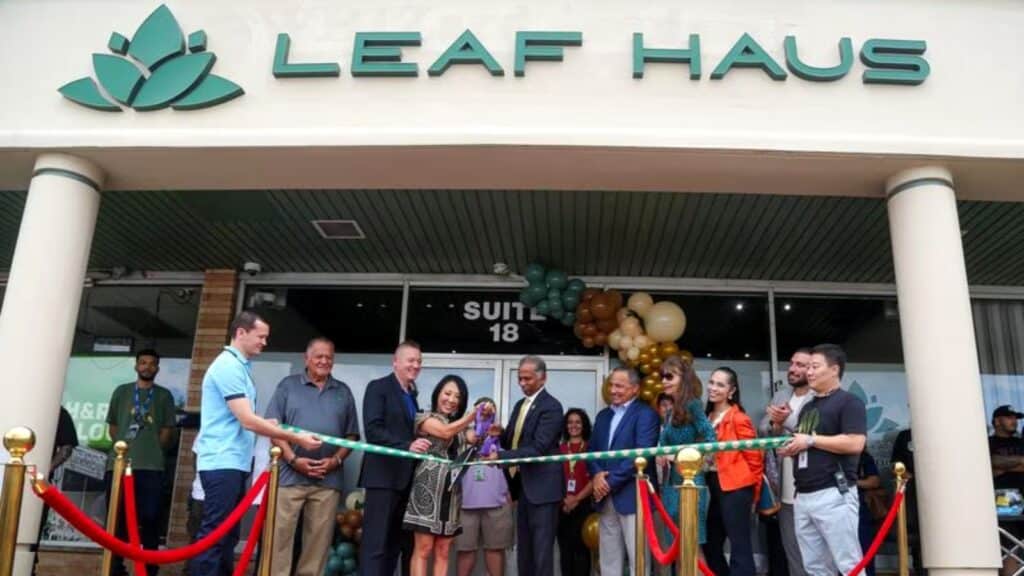 In our increasingly cashless economy it can be a genuinely upsetting experience to get to the check-out counter to see a sign that reads “CASH ONLY”, but if you’ve ever participated in the marijuana economy you know this is just the current cost of doing business in a quasi-legal marketplace. However, some are concerned that this is more than an issue of inconvenience; access to banking is an issue of public safety.
In our increasingly cashless economy it can be a genuinely upsetting experience to get to the check-out counter to see a sign that reads “CASH ONLY”, but if you’ve ever participated in the marijuana economy you know this is just the current cost of doing business in a quasi-legal marketplace. However, some are concerned that this is more than an issue of inconvenience; access to banking is an issue of public safety.
Marijuana has been dubbed the “next great American industry”, with growth numbers projected to soon eclipse all major sport leagues combined. Since legalization came to Colorado and Washington in 2012, everyone with some spare capital is looking to get into the weed game with hopes of turning green into gold. However, as those who are in the cannabis industry can tell you, marijuana sits in a very interesting place politically and economically. Marijuana may be legal in various forms across the country, but none of the more than $2 billion the industry has been valued at is allowed to be legally deposited in a bank due to federal prohibition.
This means that all transactions taking place in medical and adult-use marijuana states are done on a strictly cash-only basis. If all sales are done in cash, and businesses are unable to deposit that in a bank account, that means all normal business transactions are also done in cash. Payrolls are done in cash. Bills are paid in cash. Vendors are paid in cash. Taxes are paid in cash. Having all of this cash moving in and out of dispensaries, along with thousands of dollars in product, makes licensed cannabis retailers natural targets for robberies.
Just last week The Fourth Corner Credit Union (TFCCU) was denied access to deposit insurance by the National Credit Union Administration (NCUA), after being previously denied access to insurance through the Federal Credit Insurance Corporation (FDIC). TFCCU was chartered by the Colorado Division of Financial Services in November 2014, with the stated mission “to service the unique financial needs of the cannabis and hemp industries and their supporters”. It is now taking the issue to court to get the FDIC and NCUA rulings overturned. A recent USA Today story mentioned that the Colorado Department of Revenue has had to hire armed security to escort marijuana business owners to pay their quarterly taxes. Which begs the question, if the state governments are going to be collecting taxes from marijuana businesses (who don’t have access to banking), where are those governments depositing that money…and why don’t marijuana businesses have access to the same bank?
Our good friends over at Studio McDermott have been shooting for their documentary called Oregon: The State of Cannabis since September 2014 (right before Measure 91 passed), and one of the issues they highlight is the inability of cannabis businesses to gain access to banking services. They cut this special trailer of their film exclusively for TWB readers.
In this clip Jesse Peters of Eco Firma Farms makes the case that there is a genuine public safety issue at hand each day that the cannabis industry is denied access to banking, and that it is an issue we need to get in front of before we see headlines about someone being killed during a dispensary robbery.
Recently, Oregon Senator Jeff Merkley introduced an amendment to an appropriations bill (that was passed out of committee) that would limit the federal government’s ability to crack down on banks that work with state legal marijuana businesses. He has also introduced Marijuana Business Access to Banking Act, which is cosponsored by Senators Wyden, Gardner, Paul and Bennett, and is the companion legislation to HR 2076 which was introduced by Congressman Ed Perlmutter.
Senator Ron Wyden was quoted in a recent interview as saying,
”By compelling Oregon business owners to operate on a cash-only basis, current federal laws are making marijuana businesses sitting ducks for violent crimes and perpetuating negative stereotypes. It is ridiculous to make any business owner carry duffle bags of cash just to pay their taxes.”
Aside from ending federal prohibition of marijuana, gaining access to banking should be the #1 priority of those who want to see a fully realized cannabis industry. We need everyone across the country to call their Representatives and their Senators and tell them to sign on as co-sponsors of HR 2076 and S.1726 so that we can mitigate the danger to our loved ones in the cannabis industry and to treat cannabis like any other business. If you don’t see your Congressperson or Senator on this list, that means they haven’t yet signed on as a co-sponsor and are awaiting your phone call and/or email. If they are on this list, please be sure to call their office, email them, or tweet at them to thank them for their support of the legal cannabis industry!
S.1726 Co-Sponsors:
- Cory Gardner (R-CO)
- Michael Bennett (D-CO)
- Rand Paul (R-KY)
- Ron Wyden (D-OR)
- Patty Murray (D-WA)
- Elizabeth Warren (D-MA)
HR 2076
- Denny Heck (D-WA)
- Jared Polis (D-CO)
- Hakeem Jeffries (D-NY)
- Earl Blumenauer (D-OR)
- Charles Rangel (D-NY)
- Diana DeGette (D-CO)
- Eleanor Holmes Norton (D-DC At Large)
- James McGovern (D-MA)
- Dina Titus (D-NV)
- Scott Peters (D-CA)
- Suzan DelBene (D-WA)
- Julia Brownley (D-CA)
- Zoe Lofgren (D-CA)
- Mike Coffman (R-CO)
- Chellie Pingree (D-ME)
- Brad Sherman (D-CA)
- Kyrsten Sinema (D-AZ)
- Peter DeFazio (D-OR)
- Adam Smith (D-WA)
- Jared Huffman (D-CA)
- Kurt Schrader (D-OR)
- Donald Beyer (D-CA)
- Tulsi Gabbard (D-HI)
- Patrick Murhpy (D-FL)
- Derek Kilmer (D-WA)
- Barbara Lee (D-CA)
- Eric Swalwell (D-CA)
- Mark Pocan (D-WI)
- Mark Takai (D-HI)
- Jim McDermott (D-WA)
Also, please consider making a donation to Studio McDermott’s Oregon: The State of Cannabis project. They will be continuing to gather footage through the roll out of adult-use sales on October 1st, and then will head in to the expensive and time consuming post-production process. Any contributions will go towards helping to get this amazing project out to the public for a behind the scenes look at Oregon’s year of legalization.




